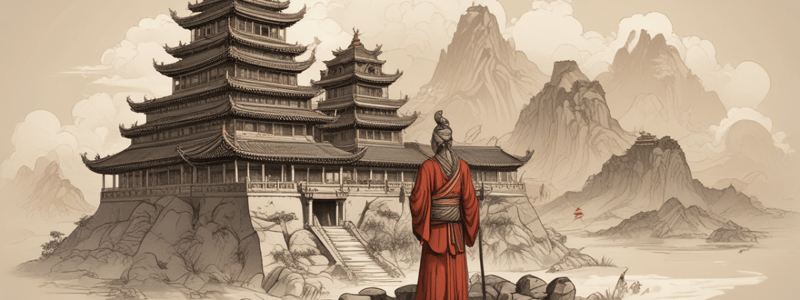Podcast
Questions and Answers
What was the state of China during the 6th century BCE?
What was the state of China during the 6th century BCE?
- In the midst of a great period of turmoil (correct)
- Unified and peaceful
- Under the control of a single powerful ruler
- Experiencing a golden age of prosperity
What was the social background of Confucius?
What was the social background of Confucius?
- A noble family
- A family of wealthy merchants
- A peasant family
- A family of minor officials (correct)
What is the central idea of Confucianism?
What is the central idea of Confucianism?
- That the goal of life is to seek personal wealth and power
- That people are naturally good and can be educated to be better (correct)
- That the ruler has absolute power and authority
- That people are naturally evil and need to be controlled
What is the concept of the 'Mandate of Heaven' in Confucianism?
What is the concept of the 'Mandate of Heaven' in Confucianism?
Who is credited with developing the philosophy of Taoism?
Who is credited with developing the philosophy of Taoism?
What is the central concern of Taoism?
What is the central concern of Taoism?
What was the appeal of Confucianism to peasants and masters during the Warring States period?
What was the appeal of Confucianism to peasants and masters during the Warring States period?
Why is it difficult to express the Tao in words?
Why is it difficult to express the Tao in words?
What is the yin-yang symbol used to represent in Taoism?
What is the yin-yang symbol used to represent in Taoism?
What is the primary focus of Confucianism?
What is the primary focus of Confucianism?
What is the main difference between Confucianism and Taoism?
What is the main difference between Confucianism and Taoism?
Why did many Chinese people follow both Confucianism and Taoism?
Why did many Chinese people follow both Confucianism and Taoism?
What is the analogy used to describe the relationship between Confucianism and Taoism?
What is the analogy used to describe the relationship between Confucianism and Taoism?
How did many Chinese people approach their daily lives in terms of Confucianism and Taoism?
How did many Chinese people approach their daily lives in terms of Confucianism and Taoism?
What is the main idea behind Taoism's concept of nature?
What is the main idea behind Taoism's concept of nature?
Flashcards are hidden until you start studying
Study Notes
China in the 6th Century BCE
- The 6th century BCE was a period of turmoil in China, with no single power uniting the country for over 200 years.
- The Zhou dynasty had nominal power during the Spring and Autumn period, but war and chaos consumed the countryside during the Warring States period.
Confucianism
- Confucius was born in the 6th century BCE to a humble family of minor officials.
- Confucianism is based on the ideals that:
- People are naturally good.
- Education helps people remain good and avoid evil.
- Relationships between people keep society functioning at its best levels.
- According to Confucius, if these requirements are met, society would be just and the ruler would have the Mandate of Heaven (moral high ground to rule).
Taoism
- Laozi was instrumental in writing about Taoism, which is concerned with understanding the Tao (the way that makes up everything in the world).
- The Tao is:
- Unable to be expressed in words, as it would limit the Tao.
- Everywhere and makes up everything.
- Important to Taoism is the idea of balance in nature, symbolized by the yin-yang symbol.
Two Philosophies in Harmony
- Confucianism and Taoism worked well together, despite their differences.
- Confucianism valued living in relationships to achieve harmony with nature, while Taoism focused on finding balance with nature to ensure good relationships.
- Many Chinese applied Confucian principles to their work lives and Taoist philosophy at home, combining both ideals to achieve harmony and balance.
Studying That Suits You
Use AI to generate personalized quizzes and flashcards to suit your learning preferences.




